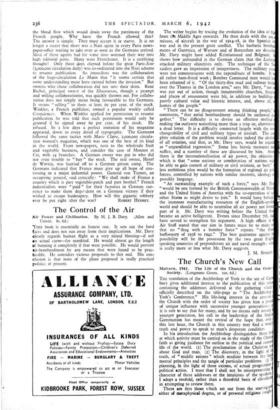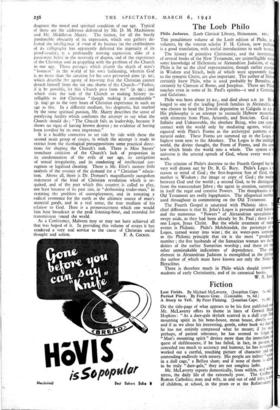The Church's New Call
Malvern, 1941. The Life of the Church and the Order Society. (Longmans Green. los. 6d.) THE translation of the Archbishop of York to the see of Cant bury gives additional interest to the publication of this vo containing the addresses delivered at the gathering which officially described on the title-page as " The Archbish0P York's Conference." His life-long interest in the concern the Church with the order of society has given him a poi of unique influence with successive younger generations ; it is safe to say that for many, and by no means only among younger generation, his call to the leadership of the MO Communion has meant the revival of the hope that, even this late hour, the Church in this country may find a word truth and power to speak to man's desperate condition. In his introduction the Archbishop distinguishes three 16 at which activity must be carried on in the study of the Chris faith as giving guidance for outline in the political and econ life of the world. (r) The proclamation of the Christian about God and man. (2) The discovery, in the light of truth, of " middle axioms " which mediate between the mental principles and the tangle of particular problems. (3) planning, in the light of these axioms, of actual programme political action. I trust that I shall not be misrepresenting character of these addresses or the intuitions of the speakers, I adopt a twofold, rather than a threefold basis of classifies in attempting to review them.
There are first those which set out from the starting either of metaphysical dogma, or of personal religious insight
diagnose the moral and spiritual condition of our age. Typical of these are the addresses delivered by Mr. D. M. Mackinnon and Mr. Middleton Murry. The former, for all the barely pardonable obscurity of its expression, which one gathers de- feated the intelligence of come of its hearers (as the crabbedness of its calligraphy has apparently defeated the ingenuity of its proof-reader), is a profoundly moving expression alike of a passionate belief in the necessity of dogma, and of the experience of the Christian soul in grappling with the problem of the Church in our age. Those passages which plumb the depth of man's " lostness " in the world of his own fashioning, wherein God is no more than the sanction for his own perverted aims (p. 92), which describe the agony of knowing that the Christian cannot detach himself from the sin and shame of the Church—" Father, if it be possible, let this Church pass from me " (p. 99) ; and which state the task of the Church as making history in- telligible to the Christian " though making it unendurable " (p. too) go to the very heart of Christian experience in such an age as this. In a different medium, less dogmatic, but marked by the same spiritual passion, Mr. Murry describes the sense of paralysing futility which confronts the attempt to say what the Church should do ; "The Church fails in leadership, because it shows no signs of having known despair ; no evidence of having been terrified by its own impotence."
It is a healthy corrective to set side by side with these the second main group of essays, in which the attempt is made to extract from the theological presuppositions some practical direc- tions for shaping the Church's task. There is Miss Sayers' trenchant criticism of the Church's lack of proportion in its condemnation of the evils of our age, its castigation of sexual irregularity, and its condoning of intellectual cor- ruption or legalised cheating. There is Mr. Eliot's austere little analysis of the essence of the demand for a " Christian " educa- tion. Above all, there is Dr. Demant's magnificently outspoken statement of the kind of Christian revolution which is re- quired, and of the part which this country: is called to play, not least because of its past sins, in "dethroning trader-man," in restating the problem of unemployment, and in restoring a radical reverence for the earth as the ultimate source of man's material goods, and in a real sense, the true medium of his relation to God. Here is a pronouncement which one would fain hear broadcast at the peak listening-hour, and recorded for transmission round the world.
As a Conference, Malvern may or may not have achieved all that was hoped of it. In providing this volume of essays it has rendered a very real service to the cause of Christian social



























 Previous page
Previous page